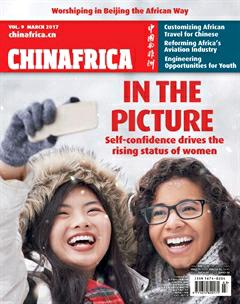Meeting the Demand
By+Cui+Xiaoqin

PEOPLE in Johannesburg, South Africa can now more easily access to traditional Chinese medicines(TCM) when they get sick. Beijing Tongrentang Africa, a subsidiary of China Beijing Tongrentang - a time-honored TCM brand with a history of 348 years - opened for business in Johannesburg last November.
“The establishment of this company in Africa marks an important milestone in introducing TCM into Africa. Its also one of the initiatives aimed at implementing the outcome of the Forum on China-Africa Cooperation (FOCAC) Johannesburg Summit held in December 2015,” said Huang Wei, Science and Technology Counselor at the Chinese Embassy in South Africa.
The time-honored company said it plans to open five stores in three cities: Johannesburg, Pretoria and Durban, with the aim of introducing high-quality TCM products and services to local people.
With the rapid development of China-Africa cooperation in recent years, the bilateral trade in medicine has also been booming. Statistics show that Chinas export of pharmaceuticals to Africa in 2015 reached 2.32 billion yuan, a year-on-year increase of 2.59 percent.
Huge cooperation potential
Ethiopias Oriental Industrial Park witnessed in October 2016 the establishment of Sansheng (Ethio) Pharmaceutical Plc. - a Chinese pharmaceutical company, which became the first pharmaceutical company to settle in the park.
According to statistics, some Sub-Saharan African countries do not have their own pharmaceutical manufacturing industry. Except from South Africa, some of these countries can only produce a small number of pharmaceutical products. Besides, local pharmaceutical products are limited only to basic drugs such as painkillers, antibiotics, anti-malaria drugs and vitamins, which can only meet 20 to 30 percent of the domestic demand.
Realizing the huge demand for medicine and the lack of self-supply capacity in the African market, many Chinese pharmaceutical companies have already invested and opened factories in Africa to localize their production. This trend is welcomed, said Ethiopian Industry Minister Mebrahtu Meles, as it will help strengthen the continents pharmaceutical production capacity.
According to Diarra Boubacar, a Malian traditional medicine doctor, there is a huge demand for medicines in many African countries. The doctorate holder told ChinAfrica that Africa has a long history of traditional medicine, but its still in the early stage of research and development. Boubacar suggested that Africa should learn from TCM. Africa also has rich herbal medicine resources, and China can import some unique African herbal medicine based on further studies, he added.
Like Ethiopia, many African countries are faced with the challenge of great demand for medicine but lack of production capacity. In Kenya, for example, Kenya Medical Supplies Authority has an annual budget of $300 million for public health, while the scale of the entire pharmaceutical market is $500 million. The countrys local producers can only meet 30 percent of the market demand, while 70 percent of medicine still relies on import.
Localized production
China Associate (Group), based in Shenzhen of Guangdong Province, is well-known in Africas pharmaceutical market. Since 1992, the company has been exporting medicines to Africa, where it quickly became an important supplier of medicine raw materials.
In 2003, it joined forces with Chinas Dandong Jinwan Group and Ethiopias ZAF Pharmaceutical Plc. to create Sino-Ethiop Associate (Africa) Plc., a joint venture that produces 2 billion pill capsules each year.
The company was set up in Ethiopias capital Addis Ababa, as the country has rich resources of cattle bones, which can be extracted to produce gelatin- the raw material used in making pill capsules. The company thus makes optimal use of local resources to meet the growing demand in the African market.
Xie Xiaoyan, former Chinese Ambassador to Ethiopia, spoke highly of the joint ventures efforts in localized production. “This project sets a good model for Sino-Ethiopian cooperation. Pill capsules not only meet Ethiopias growing needs, but also have been exported to neighboring countries, which boosts the countrys industrialization development,” said Xie at the opening ceremony of the second-phase production on December 14, 2013.
Compared with international pharmaceutical companies, Chinese pharmaceutical enterprises have the advantage of providing high-quality medicine at affordable price. On average, the price of a Chinese medicine is just one-third the price of the equivalent product overseas.
Other outstanding Chinese pharmaceutical companies, such as Guilin Pharma, Kunming Pharmaceutical Corp., and China Sinopharm International Corp., have also become well-known brands in Africa. Some have entered African countries national procurement system, while others have established good sales channels, built their brands, and even set up local branches.“While localizing their production abroad, Chinese companies should also consider local customers habits,” said Cao Jun, Deputy Director of Jiangsu Institute of Parasitic Diseases.
Legal support
Boubacar noted that Africa welcomes Chinese TCM companies, but only qualified enterprises and real products, adding that his country has heavy punishment for illegal medical practices and fake and shoddy medical products.
Guilin Pharma, a subsidiary of the Fosun Pharma Group, has signed a three-year agreement in 2016 with the African Collaborating Center for Pharmacovigilance, based in Ghanas capital Accra, for drug safety supervision, covering three of Guilin Pharmas anti-malaria drugs.
Guilin Pharma is the worlds leading producer of artesunate - a medication used to treat malaria - and currently the only company producing WHO prequalified artesunate injections. The agreement is the first of its kind in Africa between a global pharmaceutical company and an African institution specializing in pharmacovigilance.
TCM has a long history in Africa, where it has been used for more than 50 years. In South Africa especially, the government has attached great importance to the development of TCM, and recognized the legal status of TCM as early as 2000, providing a legal support for its development in the country.
Nkosazana Dlamini-Zuma, former South African Minister of Health and former African Union Commission Chairperson, extended a warm welcome to Beijing Tongrentang Africas arrival in Johannesburg. The focus of TCM on prevention, rather than only treatment, means massive savings for South African people, she said at the companys opening ceremony last November.

